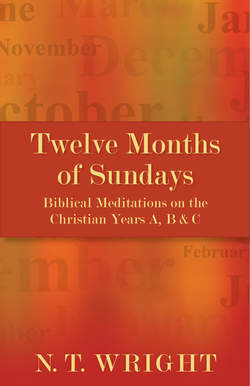Читать книгу Twelve Months of Sundays - N.T. Wright - Страница 32
На сайте Литреса книга снята с продажи.
ОглавлениеThe Fifth Sunday of Lent
(Passiontide begins)
Ezekiel 37.1–14
Romans 8.6–11
John 11.1–45
‘Resurrection’ began as a metaphor for the return from exile. Ezekiel’s surreal vision was an image of Israel, ‘dead’ in Babylon, being restored to her own land. It goes with the promises of the previous chapters, promises of covenant renewal, of cleansing from sin, of God’s gift of a new heart, a new spirit. The God who breathed into human nostrils at creation will do so again. Covenant renewal will mean new creation.
After Easter, metaphor and history changed places. ‘The resurrection’ should have happened to all God’s people at the end of time, not to one person in the middle of history; Jesus’ followers explained Easter in terms of return from exile, the long-awaited new Exodus. Romans 8 is the classic passage: what God did for Jesus he will do for all creation, liberating it from its present slavery to corruption. Those whose bodies are heading for death, but who are indwelt by God’s Spirit, are assured that what God did for Jesus as an individual he will do for all the Messiah’s people. (Notice how Paul moves between the name and the title: ‘Jesus’ is the individual, ‘Christ’ the one who represents God’s people.)
A preacher who needs help with John 11 is in bad shape. But the story has oddities as well as obvious, indeed spectacular, moments of glory. Jesus heard that Lazarus was ill, and therefore (vv. 5–6) he stayed where he was two days longer. This is only partially explained by vv. 4 and 14: Jesus has something in mind through which God’s glory will be revealed, and the disciples’ faith strengthened (perhaps not only the disciples’, either?). Jesus is the bearer of Israel’s destiny: he doesn’t just teach about the great Return, the new Exodus, he is embodying it. Then the exchange in vv. 39–42: Martha, characteristically anxious, warns about the smell from a three-day corpse; Jesus commands that the stone be removed, and then thanks the Father for having heard his prayer. We must presume that there was no smell: Jesus had prayed for Lazarus’s death to be temporary, and the prayer had been answered.
The life and light of this story are framed by a dark background. The Judaeans (not ‘the Jews’ as in most translations) include many who want to do away with Jesus, and this supreme sign – the sixth in John’s sequence, pointing on to the coming completion of Jesus’ work – will only exacerbate their opposition. Jesus’ prayer and action for Lazarus looks ahead to his own coming ordeal. The resuscitation of Lazarus into the same sort of body partially anticipates the greater event of Easter, when the Messiah will go through death and out into the unmapped new land beyond. But, as Lenten pilgrims know, the road to Easter lies along the way of the cross. Was Thomas doubting, or was he believing, when he said ‘Let’s go too, so that we may die with him’ (v. 16)?
